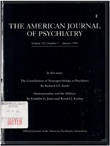Use of posttraumatic stress disorder to support an insanity defense
Abstract
OBJECTIVE: The authors examine the allegation that the diagnosis of posttraumatic stress disorder (PTSD) is frequently abused in the legal system as the basis for a defense of not guilty by reason of insanity. METHOD: Data for the investigation were drawn from a study of insanity pleas gathered from court records in 49 counties in eight states. Data on the 28 insanity plea defendants for whom PTSD was diagnosed before or immediately after trial were compared with data on 8,135 defendants whose insanity pleas were based on other diagnoses. RESULTS: Insanity pleas by defendants with diagnoses of PTSD constituted only 0.3% of the cases. There were few significant differences between the two groups on demographic variables, psychiatric histories, previous involvement in crime, or current charges. The defendants with PTSD were more likely to have been married, less likely to have been arrested as juveniles, and less likely to have been detained after trial. CONCLUSIONS: Contrary to previously expressed concerns, PTSD was infrequently associated with an insanity defense in the cases in this study. In the cases in which pleas based on PTSD were used, they were no more likely to succeed than pleas based on any other diagnosis. Defendants with PTSD-related insanity defenses differed little from other insanity defendants, contradicting the stereotype of the person who is driven by PTSD to commit crimes. The data do not support fears of widespread misuse of the diagnosis of PTSD in connection with the insanity defense.
Access content
To read the fulltext, please use one of the options below to sign in or purchase access.- Personal login
- Institutional Login
- Sign in via OpenAthens
- Register for access
-
Please login/register if you wish to pair your device and check access availability.
Not a subscriber?
PsychiatryOnline subscription options offer access to the DSM-5 library, books, journals, CME, and patient resources. This all-in-one virtual library provides psychiatrists and mental health professionals with key resources for diagnosis, treatment, research, and professional development.
Need more help? PsychiatryOnline Customer Service may be reached by emailing [email protected] or by calling 800-368-5777 (in the U.S.) or 703-907-7322 (outside the U.S.).



